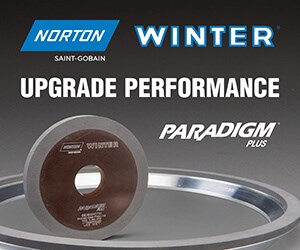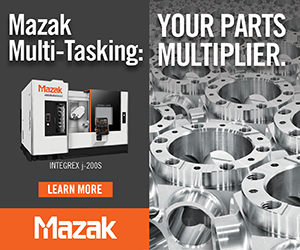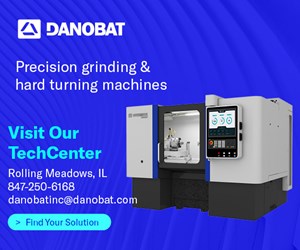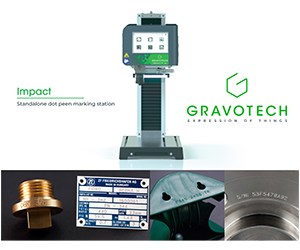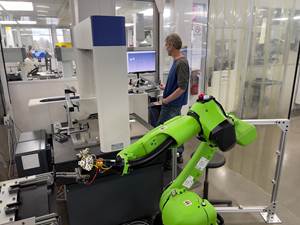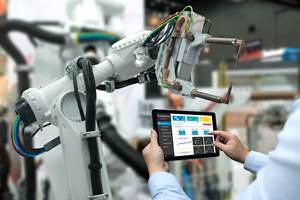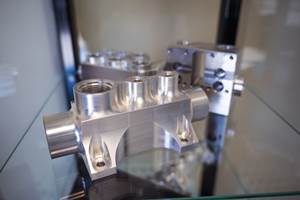5 Benefits of Sourcing CNC Machining Work Online
Machine learning saves time, makes pricing fairer, inspires improvement initiatives, and even insulates manufacturing businesses against economic shocks.
Share
Machining businesses mired in time-consuming traditional quoting might be surprised to learn that many of their counterparts are winning work with little more than a mouse click.
Precisely how many is anyone’s guess. However, several metalcutting companies source more than $1 million annually in this way from a single manufacturing matchmaking service: Xometry. Although these are top performers, other CNC machine shops constitute the majority of the 2,500-plus manufacturers bidding on this online platform (others include injection molders, additive manufacturing services and parts finishers). While many of the manufacturers are small, many of the parts purchasers are large. Some, like Bosch and BMW, have become investors, pouring more than $50 million into the company since May. A European expansion also has been announced. All this considered, a closer look at Xometry could be illuminating in terms of what the future of sourcing CNC machining work might look like.
This future would not be possible without machine learning. Based mostly on a conversation with Laurence Zuriff, Xometry’s CFO, here are five ways in which this technology helps focus more on machining parts than finding parts to machine:
1. No Quoting
Submitting a CAD file for computational geometry analysis sets Xometry’s automated system into motion. Typically within minutes, the system determines the manufacturing requirements and outputs feedback about manufacturability and lead time. Manufacturers have only to choose among the jobs posted in the interface’s partner portal. There is no negotiation involved, because terms have already been set. These terms are based on insight derived from machine learning algorithms, which routinely comb the growing cache of manufacturing job data to determine how specific part characteristics affect what customers are willing to pay and what manufacturers are willing to accept.
2. Pre-vetted Work
Work presented to any given manufacturer has already been determined to be a good fit for that company’s capacity and capabilities (metrics that factor in are submitted to Xometry by the manufacturer). Each job is associated with a percent score that provides an at-a-glance indication of the quality of the match. The higher the number, the greater the likelihood that the job will be suited for an individual machine shop’s competitive strengths — say, if a manufacturer has the necessary certifications and five-axis machining capabilities for a demanding aerospace contract.

Parts purchasers upload CAD files for (in most cases) instantaneous feedback on pricing, lead time and design for manufacturability, all informed by machine learning algorithms that are continually retrained by the company’s teams of data scientists. Manufacturers join for free to bid on work pre-vetted for them. Screenshot courtesy of Xometry.
3. Predictable Profits
The more a manufacturer trusts in the recommendations of machine learning, the greater the likelihood that it will fill capacity with a consistent level of work that it can consistently do well. For instance, a job shop might discover that it has been charging too much for a certain type of work when Xometry’s machine learning algorithms, which are backed by a five-year-old database of job data that is growing at a rate of thousands of transactions per month, recommend a lower price. Trusting in the system might reveal that work is easier than anticipated, and the shop might find itself taking on more of it.
4. A Shield Against Uncertainty
A system that routes work vetted for specific shops also helps ensure that, on the whole, the capacity of the entire network is used efficiently. The more the network grows, the greater the potential for more efficient overall capacity utilization to insulate individual manufacturers from economic shocks. For example, if the automotive industry declines, automotive machine shops can seek similar work from other industries online, and feel confident that the work will be a good fit.
5. An Incentive to Improve
To ensure quality control for customers, manufacturers can access certain work only if they have a high enough Partner Success Score. However, this metric has benefits for the manufacturers as well. First, the tiered system provides incentive to improve and take on more challenging, profitable work. Second, knowledge of the factors that go into the rating — timeliness of delivery, engagement and responsiveness to customers and Xometry, quality rates and more — ensures manufacturers know what they need to do to improve.
Related Content
Beyond the Machines: How Quality Control Software Is Automating Measurement & Inspection
A high-precision shop producing medical and aerospace parts was about to lose its quality management system. When it found a replacement, it also found a partner that helped the shop bring a new level of automation to its inspection process.
Read MoreHow to Grow the Business with Real-Time Job Status Data
ERP systems that focus on making data more accessible can improve communication within a shop, reducing wasteful errors and improving capacity.
Read MoreReinventing a Precision Shop With a Data-Driven Mindset
When this machine shop lost 90% of its business within three months, a reinvention was in order. Here's how it survived after quickly falling on hard times.
Read MoreShop Moves to Aerospace Machining With Help From ERP
Coastal Machine is an oil and gas shop that pivoted to aerospace manufacturing with the help of an ERP system that made the certification process simple.
Read More



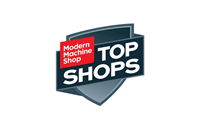

.png;maxWidth=300;quality=90)
